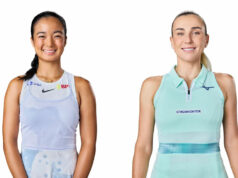For much of the fortnight, it looked like Serena Williams was finally prepped for the moment she long wanted to claim. Since her convalescence from pregnancy-induced complications in 2017, she had been a picture of inconsistency. A variety of injuries and an increased emphasis on family life stunted her return to the top of the sport. And while she proved good enough in spurts to contend for titles, she appeared tentative and unable to close the deal under the klieg lights. Thusly, she wound up with bridesmaid finishes in her last two appearances at Wimbledon and in the United States Open last year.
Nonetheless, a near-dominant run en route to yesterday’s match at Flushing Meadows changed conventional wisdom’s assessment of Williams’ chance to tie Margaret Court’s all-time record of 24 Grand Slam singles titles. Apart from a brief second-round stumble against Caty McNally, she romped through the competition to set up a widely anticipated coronation. Her booming serves and punishing groundstrokes were on point, and she seemed ready to meet the challenge against first-time major finalist Bianca Andreescu. Her sharp play gave the impression that she wouldn’t fold the way she had against Angelique Kerber, Simona Halep, and Naomi Osaka with the hardware in sight.
Unfortunately, Williams was again far from her best yesterday. In fact, she saved her worst for last. Against the supposedly inexperienced Andreescu, she displayed the same uncertain disposition that manifested itself in her immediate past attempts at glory. She was particularly shaky from the service line, and it told on her capacity to dictate points. Meanwhile, her opponent did an outstanding impression of her old ascendant self, displaying power and precision and, most importantly, passion that could withstand the pressure of position.
Indeed, Williams was decidedly the lesser from the get-go. To the shock and dismay of the packed Arthur Ashe Stadium crowd overwhelmingly in support of her projected march to greatness, she failed to summon a modicum of the form that fueled her latest run at Flushing Meadows. In retrospect, she didn’t do nearly enough to win, not in the face of her previous performances, and not against a determined Andreescu. And, on a prospective note, she would do well to learn from her spate of disappointments.
True, there is no shame in finishing second four times in the last six major tournaments. If nothing else, Williams has underscored her continued relevance even at 37. That said, she’s no longer the same force able to summon a higher gear on demand. And when those on the other side of the net aren’t old enough to remember the way she ran roughshod over the competition with ease, her task becomes harder still. In her post-mortem, she promised to do better. For fans, the hope is that she will do so soon. Else, she may want to steel herself for be inevitable. No one vanquishes Father Time, and he’s fast approaching.
Anthony L. Cuaycong has been writing Courtside since BusinessWorld introduced a Sports section in 1994. He is a consultant on strategic planning, operations and Human Resources management, corporate communications, and business development.



